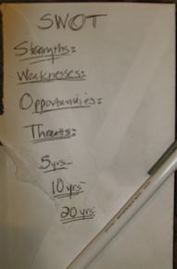 I have been fortunate to have had some wonderful mentors in my life. One in particular influenced me greatly, and I owe him a debt of gratitude to this day. He is the one who taught me how to do a SWOT self-analysis.
I have been fortunate to have had some wonderful mentors in my life. One in particular influenced me greatly, and I owe him a debt of gratitude to this day. He is the one who taught me how to do a SWOT self-analysis.
Here is how Wikipedia defines the SWOT Analysis:
SWOT Analysis is a strategic planning method used to evaluate the Strengths, Weaknesses, Opportunities, and Threats involved in a project or in a business venture. It involves specifying the objective of the business venture or project and identifying the internal and external factors that are favorable and unfavorable to achieving that objective. The technique is credited to Albert Humphrey, who led a convention at Stanford University in the 1960s and 1970s using data from Fortune 500 companies.
I was familiar with the SWOT Analysis and had used it before, but I had never heard of a personal SWOT. It was a revelation to me to consider myself an entity and study my own Strengths, Weaknesses, Opportunities and Threats. My mentor also told me to imagine what I wanted for my life in 5, 10 and 20 years.
I took the assignment very seriously and spent quite a bit of time thinking about it and discussing it with my family. They had some surprising insights. When it was done, I gave it to my mentor. He read it over, then looked me in the eye and said, “You forgot something.” I looked it over again and for the life of me could not figure out he meant.
“Your biggest strength,” he said.” “Your husband. The reason you are where you are is because your husband supports you in everything you do. He is your partner and he is willing to help you go wherever you want to go in your career.”
That was 15 years ago and I still have my SWOT page. I go back to it now and again and think about who I was then and who I am now. I highly recommend that everyone do a self-SWOT analysis and dig deep into you!
Here’s how to do it.
1. Consider your strengths. What do you think you are particularly good at? Think about your professional and personal life, your hobbies, your relationships and things that make you uniquely you. Consider what about your life makes you strong.
2. Consider your weaknesses. You don’t have to share this, so go ahead and admit the things that may have held you back in the past, or things that embarrass you about yourself. What would you like to change about yourself?
3. Consider your opportunities. What opportunities do you have to improve yourself or improve your work situation? Take one of your strengths and think about how you can match your strength with an opportunity. Go back to school. Get certified in something that interests you. Write. Speak. Mentor someone else. Start a local managers’ group. Take a clinical course if you have an administrative background. Take a management course if you have a clinical background.
4. Consider your threats. What could derail your career? Who could derail your career? Could your job be at risk if a hospital bought your practice? Could your job be at risk if one or more of your physicians retired early, or left the practice. or if your practice merged with another? Are you well-networked in your community, your specialty, your state?
5. What would you like your life to be like in 5 years? 10 years? 20 years?
6. Now, taking the previous five questions into consideration, what is your plan to take what you know about yourself and make your vision of your future come true? What should you change, or fix, or strengthen? What can you leverage? What can you do to make your career as resilient as possible? What should you do to give yourself as many future choices as possible?
Here is a helpful article on SWOT, and a video and worksheet from MindTools.

